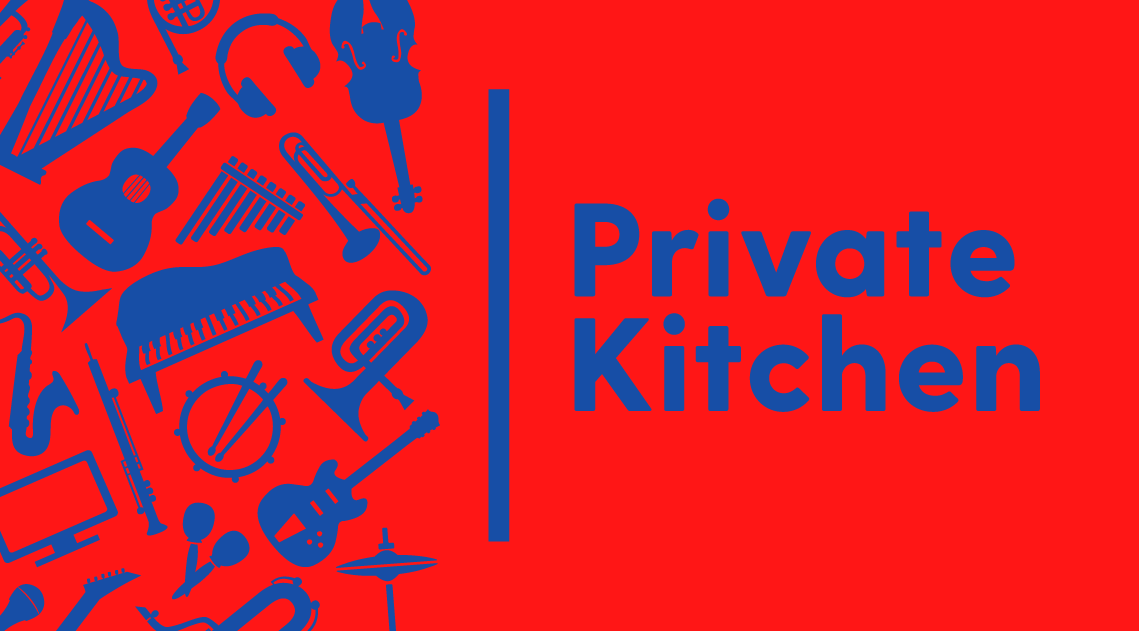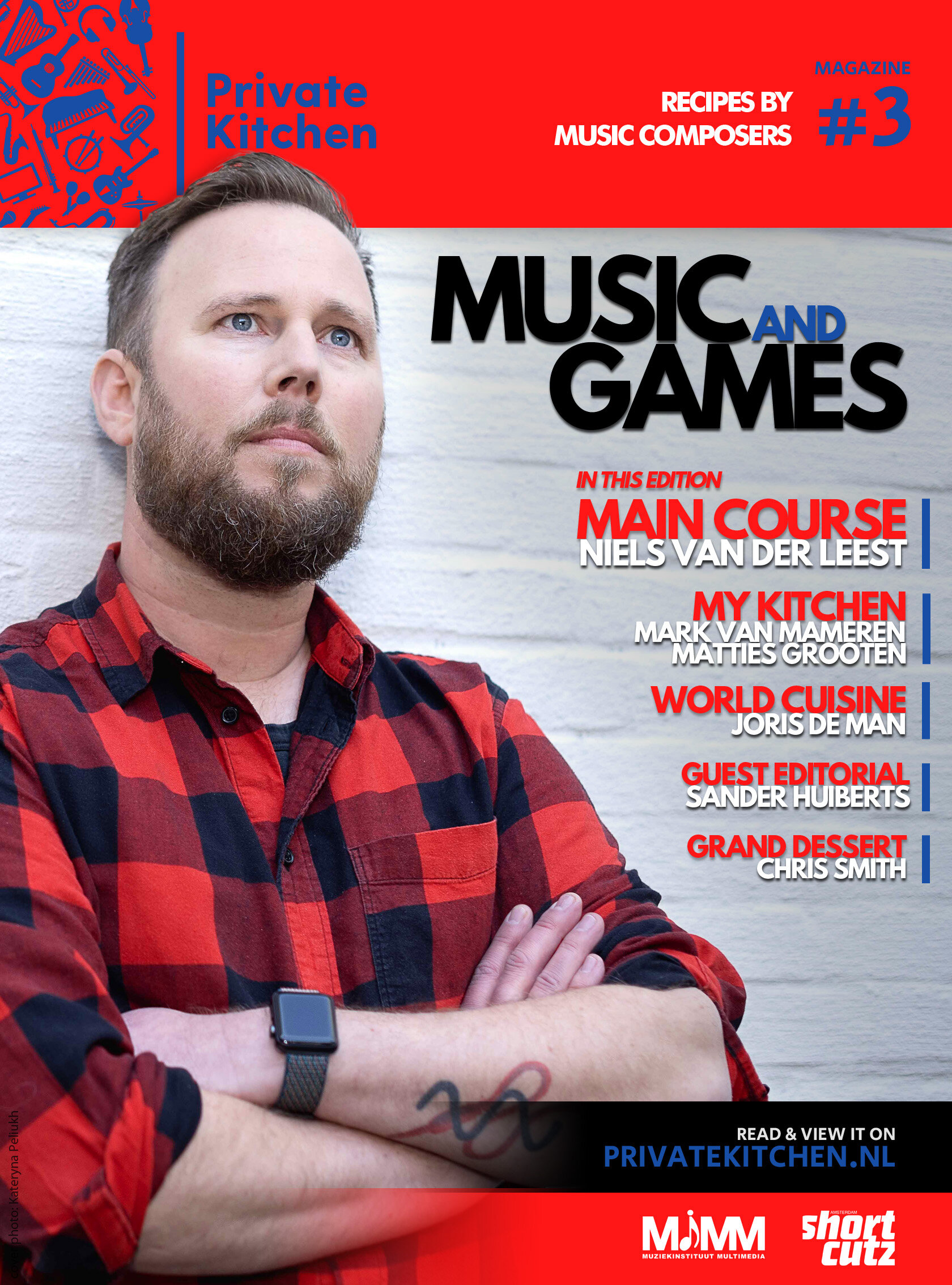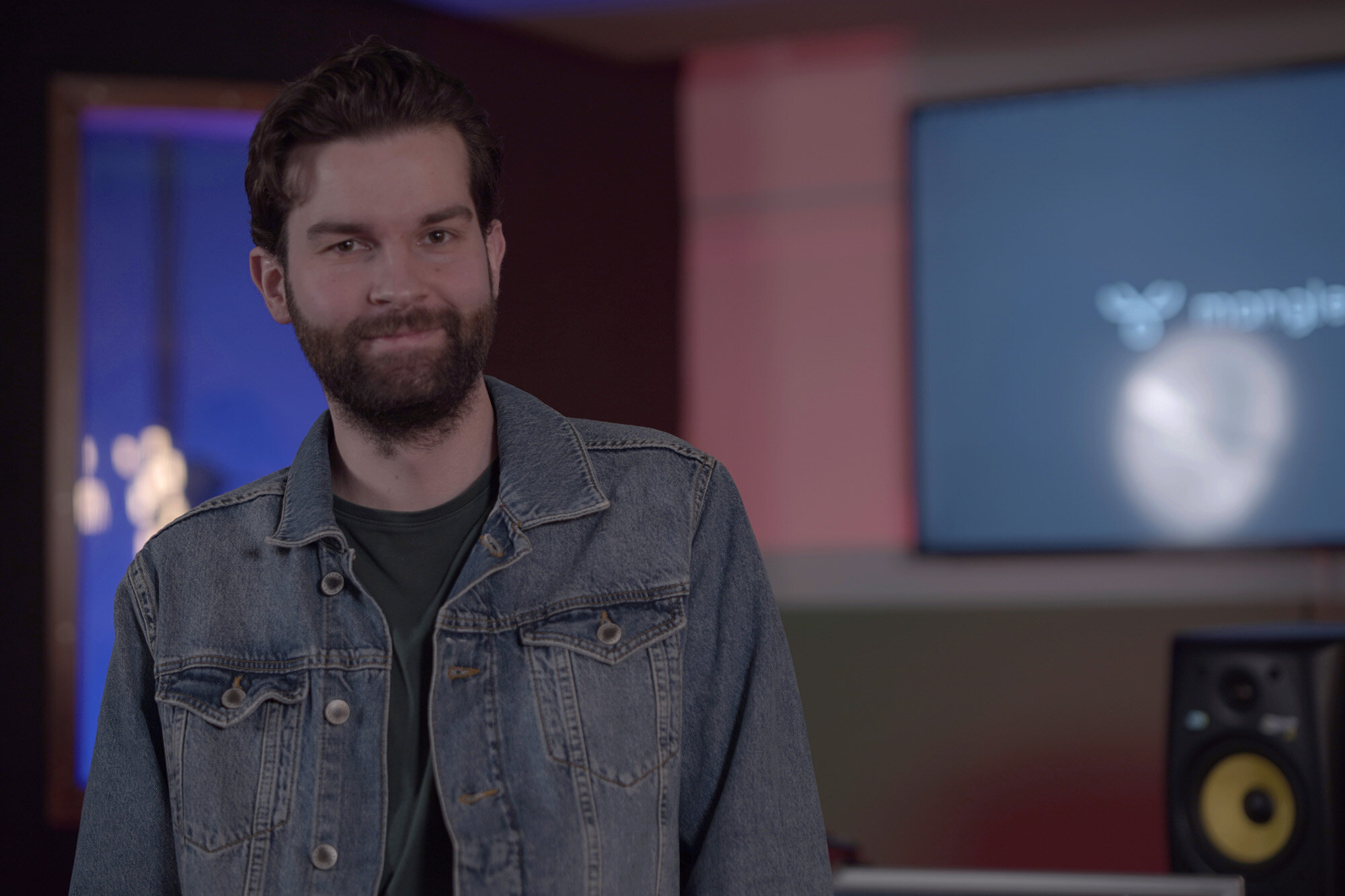
Private Kitchen
EDITION #3
MUSIC AND GAMES
In this edition game composer Niels van der Leest is questioned by Alexa Rodrigues and Rens Machielse about his music for Horizon Zero Dawn and his fascination for ‘weird instruments’. We dive into the World Cuisine of Joris de Man, one of the leading composers in the game industry and we visit the upcoming talents of Manglemoose.
As usual we have a very personal column of Chris Smith about game music and an unusual ‘spoom’ of game researcher and developer Sander Huiberts about ‘games for blind people’.

Private Kitchen |
#3 MUSIC AND GAMES
IN THIS EDITION
Filmcomposer Loek Dikker reflects on a live interactive music performance of Space Invaders, a memorable event during a Museum Night in the EYE Film Museum.
Young and upcoming talents Matties Grooten and Mark van Mameren from Manglemoose answer the, by now, well known 10 questions about their individual and collaborative work flows.
Sander Huiberts from creativehero.es and HKU Music and Technology informs us about ‘audio games for blind people’.
Niels van der Leest reflects on the journey he went through in his urge to become a game composer. And he demonstrates some of the instruments which are used in Horizon Zero Dawn.
Joris de Man being one of the world top composers in the game industry shares with us the ins and outs, the do’s and don’ts of his international career.
The UK based composer and our regular columnist Chris Smith tells us why we should admire game composers.

Amuse
MUSIC FOR GAMES: THE WINNER TAKES ALL!
Loek Dikker - film composer
The EYE Film Museum is buzzing with preparations for Museum Night Amsterdam 2013, themed “EYE Love Music". The Arena, the central hall that is typically flocked with visitors taking refuge from the cinemas and exhibition spaces for a relaxed after-dinner chat and film world professionals mingling with EYE Film Institute representatives, is transformed into a disorderly hustle and bustle of producers and artists getting ready for the night.
A large screen is hung, and Het Gelders Orkest makes its entrance into the central space. Chairs, cables, and electronics are lugged into the building; amplifiers, mixing desks and equipment to operate the planned showcases. The Arena is not the only space in the museum that is taken over: The cinema halls are also in use for the Museum Night’s events -many of which are programmed and produced by our own Music Institute MultiMedia (MiMM).
There will be "Eyecandy" from video artists throughout the building; a continuous talk show called "Private Kitchen" with media composers, film music experts, journalists and copyright officials, as well as smaller interim acts; there is a "Gerauschmacher" workshop for the audience to make their own film sound, the Music Movie Mix about image and music, and an attention-grabbing Art/Science project called The Mutual Wave Machine -a capsule whose visitors can explore when their brainwaves are "on the same wavelength," with extraordinary audiovisual consequences. .... The evening will be closed with a dazzling party with visuals and a light show.
November 02, evening.
Without doubt, the musical highlight of the Museum Night in EYE was the performance of Het Gelders Orkest, conducted by Ernst van Tiel. They performed symphonic film music for a silent film, composed by 20 collaborating composers. This was followed by a technological tour de force made possible by the Dutch Game Music (DGM) division of our Music Institute: For the first time – in a world premiere one might say - the 'live' music played by an orchestra was rendered interactive by 'live' game players! 55 tablets, on loan from Sony, were distributed among the orchestral musicians in lieu of sheet music; the conductor even had two tablets in front of him.
The game was based on Space Invaders (1978), widely regarded as the first interactive music video game. The base notes of the original score were prearranged into an opulent score, and to everyone's surprise, despite the short rehearsal time, the game's level change did indeed trigger a change in the notes on the tablets. The frequent and notable changes in the music were received with cheers from the vast audience. In his enthusiasm, the conductor accidentally flipped over one of his two tablets -as if it were a page from a score.
The technology responsible for music change per level is NLN-live, which was developed especially for this Museum Night by our Dutch Game Music department and the HKU, University of the Arts Utrecht. The NLN-live technique was published in 2014 and presented at the International Computer Music Conference in Athens.
Thus, the Museum Night project 2013 in the EYE Film Museum became a phenomenal success. Not only in terms of the sheer number of visitors (4,475), but also in terms of other statistics: the evening featured three world premieres! This included the first edition of the talk show 'Private Kitchen' - now available as a magazine. In addition 'EYE Love Music' constituted the theatrical world premiere of the Mutual Wave Machine. This installation went on to celebrate a successful international tour to various festivals and museums, and was awarded the Grand Prize of the Art of Neuroscience Competition 2016 as published in the Scientific American.
Nobody will blame us that for us, the success of the Museum Night 2013 largely lies in a world premiere of interactive technology that brings together a live symphony orchestra and live gamers, to make music together.
And this, making music together, is a real winner here indeed!
Loek Dikker
Jazz pianist
Film composer
Chairman of Music Institute MultiMedia

My Kitchen
An interview with MANGLEMOOSE
Manglemoose is a hodgepodge (Dutch: ‘mengelmoes’) of five audio technologists with a shared passion for music and sound design for media.
Their strength lies in the collaboration between the five individuals, each with their own different expertise. They believe that combining those individual talents contributes to bringing a project to an even higher level.
Together they offer a fitting solution for every project. From recording a single voice actor for a commercial to the complete audio package for film or games! Including: recording on set, composition, sound design and mixing.
Mark van Mameren
At Manglemoose, Mark is responsible for composing electronic music and mixing. He is the last stop before a Manglemoose production reaches the end user. That means making sure that all audio meet the latest technical standards and sound the best they can.
Matties Grooten
At Manglemoose, Matties works as a composer for all kinds of media. He likes to combine orchestral sounds with synthetic elements to create atmospheric film music.

MY KITCHEN - MANGLEMOOSE
interview part I
Mark van Mameren and Matties Grooten being the two main composers of Manglemoose answer the ten questions we ask in Private Kitchen every month and exchange their ideas about music, composition methods, and their favourite composer.

MY KITCHEN - MANGLEMOOSE
interview part II
In this second part of the interview Mark and Matties give a more detailed insight in their composition process for games and how to mix audio in the game in a proper way.
Sander Huiberts
music designer and researcher
Sander Huiberts is a music designer, educator and researcher. He received a PhD degree from the University of Portsmouth for investigating the role of audio for immersion in video games. At the HKU University of the Arts Utrecht he is a course leader and senior lecturer. His fields of expertise are sonic interaction design, game audio design, nonlinear music systems, design for the visually impaired and creative design practices.
As one of the founders of the Amsterdam-based creation studio Creative Heroes he initiates projects and develops concepts. Furthermore, he is a double bass player.

SPOOM - guest editorial
Playing a game with your eyes closed
by Sander Huiberts - MUSIC DESIGNER & RESEARCHER
A racing game for the blind. Have you ever considered the possibility? In 2001, 2 colleagues and me published a racing game that you can play by trusting your ears only. We developed this game because blind people were incapable of playing regular video games. But also because we were on a quest to explore the boundaries of our medium: the auditory domain.
At the time, we reached an appreciative audience of tens of thousands of visually impaired people around the world with our futuristic audio racer called 'Drive'.
From then on, a community of audio gamers formed out of sight of the mainstream game industry. The developers that serve this 'niche market' are frequently visually impaired themselves and make games for their fellow players in the absence of larger productions.
Playing audio games is a bit like playing a musical instrument with your eyes closed and your ears open, with the objective to perceive a story or to score points. The interesting thing for developers is that you can create a time-based experience, and by doing so you can alter the players' perception of time. This way, time travel is possible, as well as the creation of entirely new concepts with sound as the basis.
The iOS game 'Papa Sangre' (2013) was marketed as a 'video game with no video'. Being a horror game with only binaural sound, it lets you experience the sound around you in a very convincing way. It is a liberating game that you can play with your iPhone wherever you want: on public transport, on the porch - and yes, even outside in the dark. Not for the faint of heart! After all, the scariest things in the horror genre are often the things you can expect but can't see coming...and in this game you quite literally see nothing coming.
Papa Sangre received rave reviews, but in the long run showed not to be a blockbuster game for the masses, such as for instance Candy Crush. Podcasts – also audio-only experiences - have managed to serve a steady audience big enough for larger publishers. In the field of audio games, we do not see such a scale.
Do mainstream gamers miss the complementary effect of visuals and sound and is an audio game considered as only half the experience? Could the current app markets be a little difficult to access for non-standard concepts? Or is it hard to reach the right audience and is this a marketing challenge?
Whatever the reason for audio games remaining a niche market, as game audio educators at HKU we have been challenging students in the fields of audio design and game design to create audio games for many years. There is no better way to learn about your medium than by encountering the limits of your field - and crossing them. Who seizes the opportunity to create the next sensational audio game experience?
Sander Huiberts
Drive (the Dutch version is called Sneller) was developed by Richard van Tol, Hugo Verweij and Sander Huiberts, HKU Music & Technology and the Bartiméus Foundation. visit creativehero.es/drive
AudioGames.net is the largest community portal for audio games: games based on sound. The site is mostly run by visually impaired gamers. Visit audiogames.net
Some gamers with an impairment urge mainstream game developers to make their games more accessible. A notable development was that In The Last of Us 2, an impressive amount of accessibility options has been added by the developer. In the second video you see a player reacting to these options.
Papa Sangre (2013, by Somethin' Else) - watch Gameplay footage

Main Course
An interview with NIELS VAN DER LEEST
INTRODUCTION
Niels van der Leest is an award winning game composer and sound designer who has been in games since 2007. Over the course of the years he has worked with developers ranging from independent to AAA.
Niels combines his classical music degree in percussion and world music, his background in the orchestral and ensemble performance and the strong sense of sound design to create unique music and sounds.
How to get into the game business
How the game Final Fantasy 7 transformed Niels from a classical trained percussionist into a first class game composer. And what NOT to do if you want to get into the game business as a composer.
Composition processes and very large japanese drums!
How Horizon Zero Dawn changed the composition process of Niels and how do you record one of the largest drums on earth?
composing for film and games, and Why three composers?
About the differences between composing for film and composing for games. And why three composers for Horizon Zero Dawn? How does that work?

Reflections
Written as a study piece by Niels van der Leest
Scenes of Horizon Zero Dawn and Niels his approach
How Niels developed musical ideas for Horizon Zero Dawn and how to relate to the sound design in a game.
How to deal with weird instruments?
Niels demonstrates some of the instruments he used in the score for Horizon Zero Dawn and and he even had specific bow instruments designed to create specific soundscapes.
Final Words!
Everything about NDA’s (non-disclosure agreements)!

WORLD CUISINE
An interview with JORIS DE MAN
GAME COMPOSER
Joris de Man is a two time Ivor Novello winning and Bafta nominated composer with 25 years of experience scoring for video games, animation, film, tv and commercials.
With compositions crossing many styles, from glitchy electronica to orchestral sounds and hybrid acoustical minimalism, his focus has always been on strong, recognisable melodies and story-driven music that supports the emotional journey and personality of the characters it voices.
Known for the epic live orchestral scores to the first 3 titles in Guerrilla Games / Sony's Killzone franchise, other recent works include Guerrilla's recent Playstation 4 blockbuster 'Horizon Zero Dawn', its DLC 'HZD - The Frozen Wilds', MOBA hit 'Vainglory' used for Apple’s iPhone 6 launch, and live orchestral score for Bafta-winning director Mike Mort's animated feature 'Chuck Steel - Night of the Trampires' premiering at the 39th Annecy Animation Festival 2018.
Joris has recorded with the Prague Philharmonic Orchestra, Moscow Symphony Orchestra, and with world-class London session players at Abbey Road and Air Studios, for the award winning scores to Killzone 2 and 3, and Horizon Zero Dawn.
Getting Joris to write for your production is not just about music, his approach to composing takes in a complete sonic view. Sculpting a distinct palette, discerning sounds from tone, and finessing the mix, he creates a score that complements the visual experience, keeping audiences immersed.

Interview JORIS DE MAN and RENS MACHIELSE
World CUISINE
The world known composer Joris de Man tells us everything about his musical background, his career as a composer for games and other media forms and his international adventures. In addition he shows many clips of his work varying from 3-channel chip music for the Atari ST 1040 till the ‘making of’ the music for the ‘Tribal’ Launch Trailer of Horizon Zero Dawn.

COOK WANTED
Help composers find their way into work: pitch us your projects.
Are you involved in games and are you looking for a composer for your game?
Please contact Private Kitchen and we will arrange mediation.
CHRIS SMITH
FILM COMPOSER
Chris Smith is one of the UK's most respected producers and composers of media music, being also involved in creator's rights.
His has been a board member of the British composers' academy BASCA, -now Ivors Academy- and he ran the Faber Music Academy (Faber is representing composers like Danny Elfman and Thomas Adès). Recently he is a board director of PCAM, the society for composers and producers of mediamusic.

GRAND DESSERT
MUSIC FOR GAMES
FROM 8-BIT CHIP TO 80-PIECE ORCHESTRA
by Chris Smith - Film Composer
I must start this piece with an admission: I don’t really play computer games. Apart from early flirtations with Pong and a slightly more serious dalliance with Space Invaders, the only game that I have played enough to attain any reasonable level of skill is Dynamite Dan, the 1985 8-bit game written originally for the ZX Spectrum.
The reason for this involvement was due to the fact that the game was created by my then song-writing partner, Rod Bowkett, and every time we got together at his flat to write he would update me on the latest developments of the game and employ me as a guinea pig beta tester. As a highly gifted musician, Rod was determined to stretch the possibilities of what could be achieved musically with the tiny amount of memory available to him and was rightly proud of his sonically one-dimensional rendition of Mozart’s Rondo Alla Turca for his opening theme, as well as witty little musical gags such as an 8-bit reference to the theme tune of the TV show This Is Your Life each time Dan acquired an additional life!
Dynamite Dan was a highly entertaining and highly successful game that when seen against what is being produced today seems like etchings on a cave wall compared to the work of Van Gogh or Picasso.
The evolution of computer games describes an exponential curve which starts rather slowly and takes off in an almost vertical line in 2001 with the launch of Microsoft’s Xbox along with its launch title Halo: Combat Evolved.
The level of sophistication that the graphics, the complexity of the environments and the entire playing experience has achieved since then has driven a similar development in the creation of game music.
In 2015 Jessica Curry’s beautifully pastoral orchestral score for Everybody’s Gone To The Rapture marked a development of the idea of ‘self-generative’ music, whereby the actions and decisions of the player in themselves trigger the way in which musical elements are reconstituted. Although by no means the first example of interactive music – or what the composer herself describes as “procedure audio” - it has certainly helped pave the way for the increasingly interactive scores that feature in contemporary games.
This is well encapsulated by Escapist Magazine’s review of Austin Wintory’s score for The Pathless, which describes this type of musical interactivity with the player: “It feels like there’s an orchestra in your living room, reacting and adapting to your every decision.” It is interesting to consider how in some respects this seamless reactivity resembles the instant musical responses to film narrative made by the Wurlitzer organist in the early days of silent movies, or in a more contemporary comparison, a film editor reassembling musical stems to create a previously unimagined composition.
The demands made of composers producing music with so many possible permutations for games that can last upward of 15 hours look mind-blowingly daunting to someone like me, more used to writing music for a single linear narrative.
To those composers who do it so beautifully, so dramatically and so effectively, I say: Chapeau!
Chris Smith








PRIVATE KITCHEN MAGAZINE IS CREATED BY
Private Kitchen - Main Course
Loek Dikker - executive producer
Rens Machielse - executive producer / co-host
Sebastiaan Donders - producer
João Rodrigues - show producer / director
Alexa Rodrigues - host / set design
David Dramm - host Splendor / location
guest:
Niels van der Leest - game composer
Lucas Kauter - camera / lights / editing
Maja Andersson - camera
Nathalie de Jong - camera
Hans van Eck - sound
Kateryna Peliukh - photography
Alisa Durgun - make-up / styling
Private Kitchen - World Cuisine
Rens Machielse - host / interview
Sebastiaan Donders - editing
guest:
Joris de Man - game composer
Private Kitchen - My Kitchen
Rens Machielse - producer
João Rodrigues - AV director
Alexa Rodrigues - host / interview
Maja Andersson - camera / editing / photography
guests:
Mark van Mameren - music composer
Matties Grooten - music composer
Private Kitchen & Magazine
Rens Machielse - chief editor
Sebastiaan Donders - designer / editor
Loek Dikker - editor
Kateryna Peliukh - photography
























